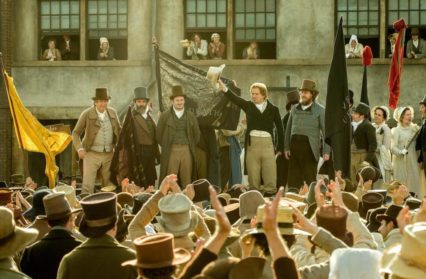Thomas Tyrrell reviews Peterloo directed by Mike Leigh, a costume drama with effective and entertaining moments of satire.
It’s a source of pride to some and bafflement to others that Britain has never had a revolution, especially of the kind that were so popular on the continent during the nineteenth century. If there was ever a time when the people were closest to rising, however, it was in 1819. George III, ‘an old, mad, blind, despised and dying King’, had been replaced by the Prince Regent, ‘a fat Adonis of fifty’, whose early promises of reform had been tossed aside the moment he’d achieved power. Britain had emerged victorious from a fifteen-year war with Napoleonic France, but for the common people the times just got harder. The corn laws, forbidding the importation of grain from outside the country, enriched landowners at the expense of the labouring classes, who saw the price of bread rising inexorably. A paranoid government clamped down on dissent, including movements for constitutional reform and representative democracy. And then there was the Peterloo massacre.
In August 1819, over 60,000 unarmed protestors for reform gathered at a peaceful rally in St Peter’s Field, near Manchester. With no provocation, the cavalry charged them with drawn sabres. Eighteen people were killed, and over 700 wounded. As the two-hundred-year anniversary of this shocking act of state-sanctioned violence approaches, the Peterloo Memorial Campaign has been calling for a permanent memorial to the slaughter. Now its spokeswoman, Maxine Peake, has joined with the veteran British director Mike Leigh to give us a film which succeeds in commemorating the event and communicating it to a wider audience. If the film has any other messages, they are left sadly unclear.
The opening focusses on the family which one would suppose to be at the heart of the story: out-of-work weaver Joshua (Pearce Quigley), his wife Nellie (Maxine Peake) and their son Joseph (David Morst), a traumatised bugler who has only recently staggered home from the Battle of Waterloo. In the event, however, they are abandoned for upwards of half an hour at a time for an endless succession of orators and printers, magistrates and generals, informers and reformers. They drop back in only occasionally, to tell us that times is hard, or to discuss points raised in a political meeting we’ve already seen.
There are a lot of political meetings in this film. At first, the film’s confidence in our attention span and the colourful nineteenth-century oratory is rather engaging. There are some magnificent accents and period rhetoric thrown into the mix, as well as colourful figures of speech. One orator speaks of ripples growing into ‘mighty magnificent waves of reform’, while a wilder radical speaks of tearing the King limb from limb like a Maenad on the slopes of Mount Cithaeron. After a while, however, it’s noticeable that the direction of these scenes follows an unchanging pattern. Shots of the speaker are paired with shots of the audience, heckling or applauding, followed by a shot of a sinister informer lurking in the background. I began to wish for some of the flair of Spike Lee’s Black KKKlansman (2018), with its skilled intercutting of an elderly man’s description of a lynching and a Ku Klux Klan initiation ritual. As the 90-minute mark ticked by without the field of Peterloo making an appearance, I began to feel a little impatient. As the two-hour point arrived and found our orators standing on the hustings saying things like ‘a vast multitude’ and ‘truly sir, I have never seen such a crowd’, I began to wish the cavalry would hurry up and charge. Not, I fear, the intended effect.
The film’s strongest and most entertaining scenes are its satiric ones. A highlight is the sequence where a disgruntled workman flings a potato through the window of the Prince Regent’s coach, causing the Home Secretary to overreact wildly and declare the suspension of Habeus Corpus. When the gang of sub-Dickensian grotesques that are the Manchester magistrates are more engaging than the characters with whom we’re supposed to sympathise, however, it becomes apparent the film is in trouble.
It is perhaps rather too common to say of a costume drama that it would work better as a TV series, but the imposition of a tighter narrative focus, an emphasis on character development and a few cliffhangers would certainly improve this script. By the time we reach the massacre itself, our interest has been spread so thinly over so many different characters that the death of Joseph, who has survived the field of Waterloo only to die attending a peaceful protest at home, comes across as a mere vignette rather than the film’s crowning irony. An abrupt ending means we never see the effects of the massacre on the wider populace, and the fates of the vast majority of the characters are left hanging. Anyone going in to the cinema curious to know why the scandal of Peterloo didn’t lead to an English revolution, will find the film has no answers.
On the positive side, the painterly attention to framing and period detail Mike Leigh showed in Mr Turner (2014) serves him well here. Working class Manchester looks authentically ragged and downtrodden, but possessed of a certain majesty. There will likely never be a more vivid and shocking recreation of the Peterloo massacre than this. Like a speech by a bad orator, on the other hand, if Peterloo had any other point to make, it is deeply buried under its own long-windedness.
You might also like…
In the second of Wales Arts Review’s series looking specifically at the experiences of working class voices in Wales, Mike Jenkins, who for 25 years has been co-editor of the Red Poets’ output, looks back over the story of the collective.
Thomas Tyrrell is a regular contributor to Wales Arts Review.












